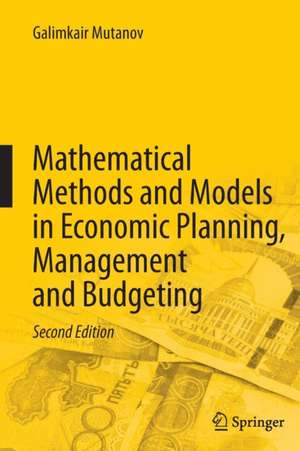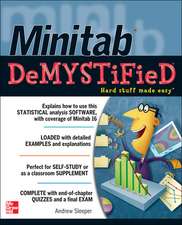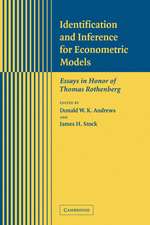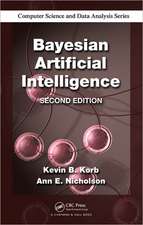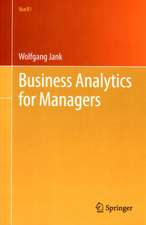Mathematical Methods and Models in Economic Planning, Management and Budgeting
Autor Galimkair Mutanoven Limba Engleză Paperback – 22 sep 2016
Regarding your book "Mathematical Methods and Models in Economics", I am impressed because now it is time when "econometrics" is becoming more appreciated by economists and by schools that are the hostsor employers of modern economists. ... Your presented results really impressed me.
John F. Nash, Jr., Princeton University, Nobel Memorial Prize in Economic Sciences
The book is within my scope of interest because of its novelty and practicality.
First, there is a need for realistic modeling of complex systems, both natural and artificial that conclude computer and economic systems. There has been an ongoing effort in developing models dealing with complexity and incomplete knowledge. Consequently, it is clear to recognize the contribution of Mutanov to encapsulate economic modeling with emphasis on budgeting and innovation.
Secondly, the method proposed by Mutanov has been verified by applying to the case of the Republic of Kazakhstan, with her vibrant emerging economy.
Thirdly, Chapter 5 of the book is of particular interest for the computer technology community because it deals with innovation.
In summary, the book of Mutanov should become one of the outstanding recognized pragmatic guides for dealing with innovative systems.
Andrzej Rucinski, University of New Hampshire
This book is unique in its theoretical findings and practical applicability. The book is an illuminating study based on an applied mathematical model which uses methods such as linear programming and input-output analysis. Moreover, this work demonstrates the author’s great insight and academic brilliance in the fields of finance, technological innovations and marketing vis-à-vis the market economy. From both theoretical and practical standpoint, this work is indeed a great achievement.
Yeon Cheon Oh, President of Seoul National University
| Toate formatele și edițiile | Preț | Express |
|---|---|---|
| Paperback (1) | 997.23 lei 6-8 săpt. | |
| Springer Berlin, Heidelberg – 22 sep 2016 | 997.23 lei 6-8 săpt. | |
| Hardback (1) | 1003.20 lei 6-8 săpt. | |
| Springer Berlin, Heidelberg – 13 noi 2014 | 1003.20 lei 6-8 săpt. |
Preț: 997.23 lei
Preț vechi: 1216.13 lei
-18% Nou
Puncte Express: 1496
Preț estimativ în valută:
190.85€ • 198.51$ • 157.55£
190.85€ • 198.51$ • 157.55£
Carte tipărită la comandă
Livrare economică 14-28 aprilie
Preluare comenzi: 021 569.72.76
Specificații
ISBN-13: 9783662525883
ISBN-10: 3662525887
Pagini: 370
Ilustrații: XIV, 356 p. 99 illus., 19 illus. in color.
Dimensiuni: 155 x 235 x 20 mm
Greutate: 0.52 kg
Ediția:Softcover reprint of the original 2nd ed. 2015
Editura: Springer Berlin, Heidelberg
Colecția Springer
Locul publicării:Berlin, Heidelberg, Germany
ISBN-10: 3662525887
Pagini: 370
Ilustrații: XIV, 356 p. 99 illus., 19 illus. in color.
Dimensiuni: 155 x 235 x 20 mm
Greutate: 0.52 kg
Ediția:Softcover reprint of the original 2nd ed. 2015
Editura: Springer Berlin, Heidelberg
Colecția Springer
Locul publicării:Berlin, Heidelberg, Germany
Cuprins
Preface.- Mathematical methods of budget modeling.- Methods and mathematical models of budget management.- Energy-entropic methods in assessment and control of economic systems.- Currency trading methods and mathematical models.- Methods and mathematical models of innovation project appraisal.- Mathematical methods for making investment decisions.- Multi-objective stochastic models for making decisions on resource allocation.- Mathematical methods and models for monitoring of government programs.- Methodology for identification of competitive industrial clusters.
Recenzii
“‘Mathematical Methods and Models in Economic Planning, Management and Budgeting (Second Edition)’ is a work of great breath that describes a set of mathematical models and methods useful to analyze real economic and managerial decisions, aiming to give a great support to their effectiveness. … an outstanding work, indispensable for economists, mathematical economists, and members of the computer technology community. Important for academics, researchers, real-world professionals and policy makers.” (Manuel Alberto M. Ferreira, International Journal of Latest Trends in Finance & Economic Sciences, Vol. 7 (2), December, 2017)
Textul de pe ultima copertă
This book describes a system of mathematical models and methods that can be used to analyze real economic and managerial decisions and to improve their effectiveness. Application areas include: management of development and operation budgets, assessment and management of economic systems using an energy entropy approach, equation of exchange rates and forecasting foreign exchange operations, evaluation of innovative projects, monitoring of governmental programs, risk management of investment processes, decisions on the allocation of resources, and identification of competitive industrial clusters. The proposed methods and models were tested on the example of Kazakhstan’s economy, but the generated solutions will be useful for applications at other levels and in other countries.
Regarding your book "Mathematical Methods and Models in Economics", I am impressed because now it is time when "econometrics" is becoming more appreciated by economists and by schools that are the hostsor employers of modern economists. ... Your presented results really impressed me.
John F. Nash, Jr. – Princeton University, Nobel Memorial Prize in Economic Sciences
The book is within my scope of interest because of its novelty and practicality.
First, there is a need for realistic modeling of complex systems, both natural and artificial that conclude computer and economic systems. There has been an ongoing effort in developing models dealing with complexity and incomplete knowledge. Consequently, it is clear to recognize the contribution of Mutanov to encapsulate economic modeling with emphasis on budgeting and innovation.
Secondly, the method proposed by Mutanov has been verified by applying to the case of the Republic of Kazakhstan, with her vibrant emerging economy.
Thirdly, Chapter 5 of the book is of particular interest for the computer technology community because it deals with innovation.
In summary, the book of Mutanov should become one of the outstanding recognized pragmatic guides for dealing with innovative systems.
Andrzej Rucinski, University of New Hampshire
This book is unique in its theoretical findings and practical applicability. The book is an illuminating study based on an applied mathematical model which uses methods such as linear programming and input-output analysis. Moreover, this work demonstrates the author’s great insight and academic brilliance in the fields of finance, technological innovations and marketing vis-à-vis the market economy. From both theoretical and practical standpoint, this work is indeed a great achievement.
Yeon Cheon Oh – President of Seoul National University
Regarding your book "Mathematical Methods and Models in Economics", I am impressed because now it is time when "econometrics" is becoming more appreciated by economists and by schools that are the hostsor employers of modern economists. ... Your presented results really impressed me.
John F. Nash, Jr. – Princeton University, Nobel Memorial Prize in Economic Sciences
The book is within my scope of interest because of its novelty and practicality.
First, there is a need for realistic modeling of complex systems, both natural and artificial that conclude computer and economic systems. There has been an ongoing effort in developing models dealing with complexity and incomplete knowledge. Consequently, it is clear to recognize the contribution of Mutanov to encapsulate economic modeling with emphasis on budgeting and innovation.
Secondly, the method proposed by Mutanov has been verified by applying to the case of the Republic of Kazakhstan, with her vibrant emerging economy.
Thirdly, Chapter 5 of the book is of particular interest for the computer technology community because it deals with innovation.
In summary, the book of Mutanov should become one of the outstanding recognized pragmatic guides for dealing with innovative systems.
Andrzej Rucinski, University of New Hampshire
This book is unique in its theoretical findings and practical applicability. The book is an illuminating study based on an applied mathematical model which uses methods such as linear programming and input-output analysis. Moreover, this work demonstrates the author’s great insight and academic brilliance in the fields of finance, technological innovations and marketing vis-à-vis the market economy. From both theoretical and practical standpoint, this work is indeed a great achievement.
Yeon Cheon Oh – President of Seoul National University
Caracteristici
Presents economic research results based on innovative mathematical models and methods For a deeper understanding these are accompanied by computing experiments on the presented topics Gives new insights into the development of economic processes and systems Includes supplementary material: sn.pub/extras
